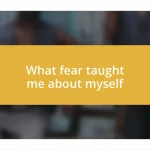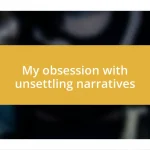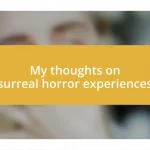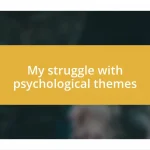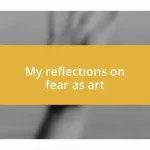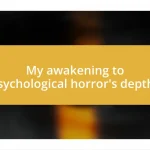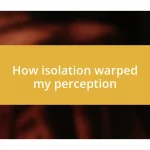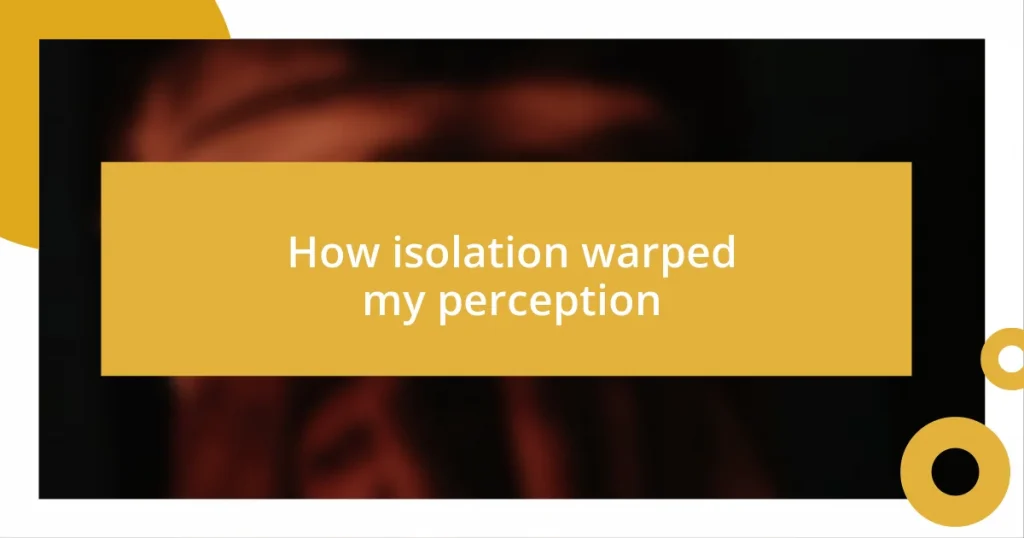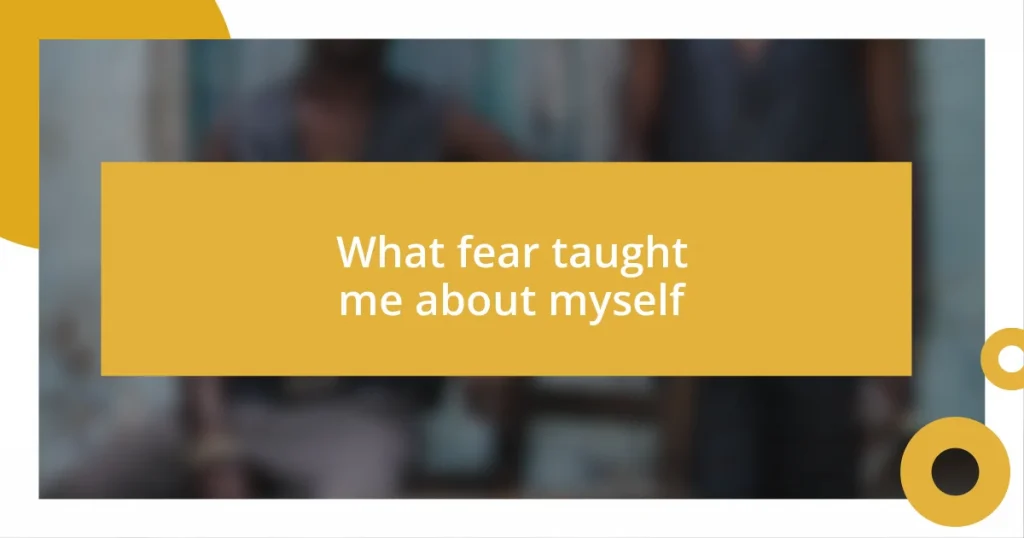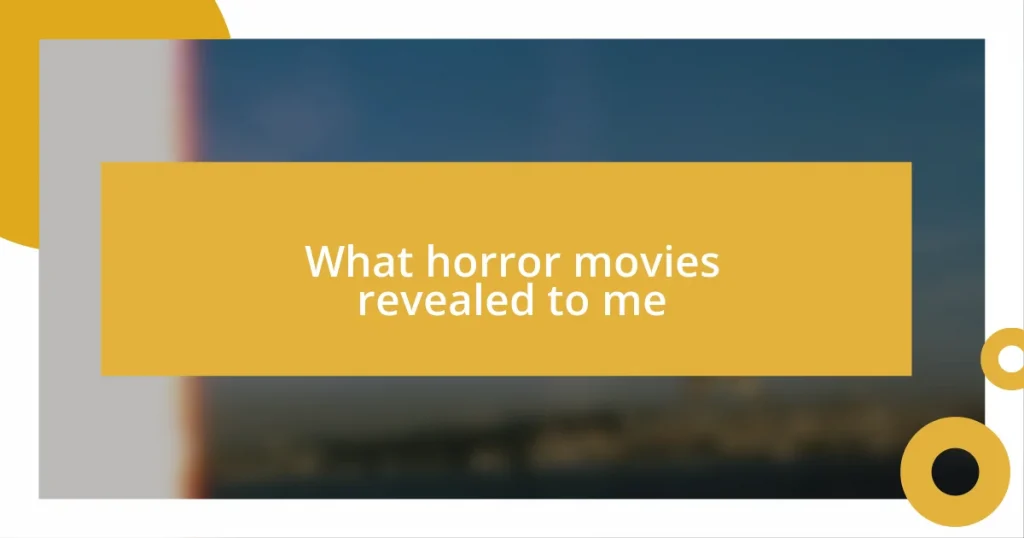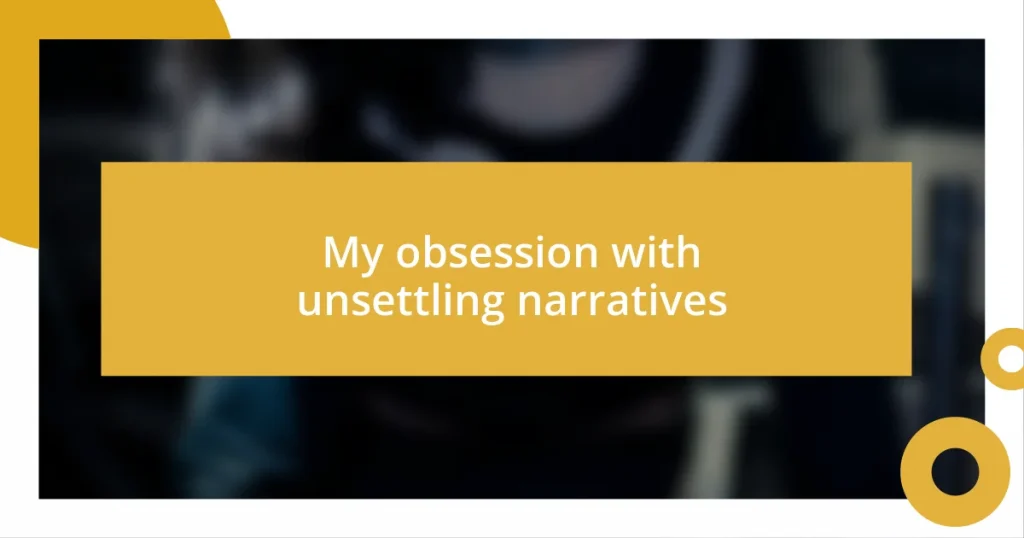Key takeaways:
- Isolation can distort perceptions of self-worth and relationships, leading to heightened anxiety and overthinking.
- Practices like journaling, mindfulness, and gratitude can help regain mental clarity and counteract negative thought patterns.
- Rebuilding connections through vulnerability and seeking professional support are vital steps in overcoming feelings of isolation.
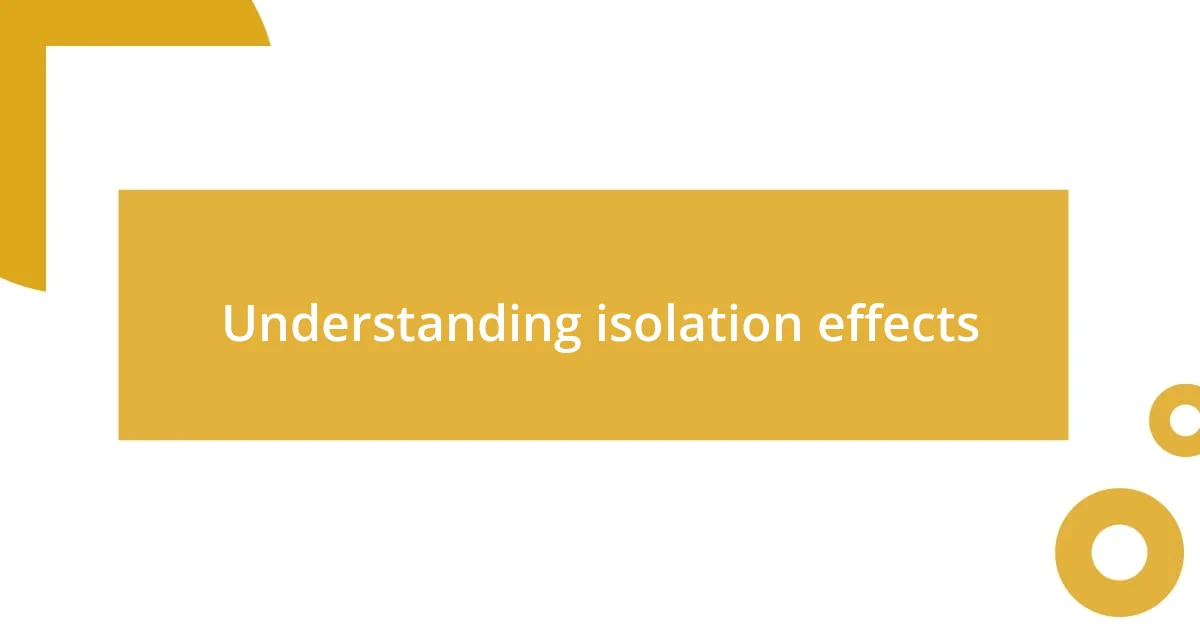
Understanding isolation effects
Isolation can profoundly distort how we perceive ourselves and the world around us. I remember a time when I spent weeks mostly alone, and it felt as if my thoughts became more intense and darker. Was it just me, or did others experience this tension that seemed to spiral out of control?
As days passed, familiar routines began to lose their meaning. Something as simple as a morning coffee felt like a distant memory rather than a cherished ritual. Have you ever experienced that claustrophobic feeling where even small moments felt exaggerated and overwhelming? It’s as if isolation wielded a magnifying glass over my insecurities, making them loom larger than life itself.
The effects of isolation aren’t just about feeling lonely; they seep into the way we interpret interactions and relationships. I found myself overanalyzing every text and call, wondering if I was misjudging intentions or reading too much into simple gestures. Isn’t it wild how the absence of community can twist our narrative, leaving us feeling disconnected even from those we love?
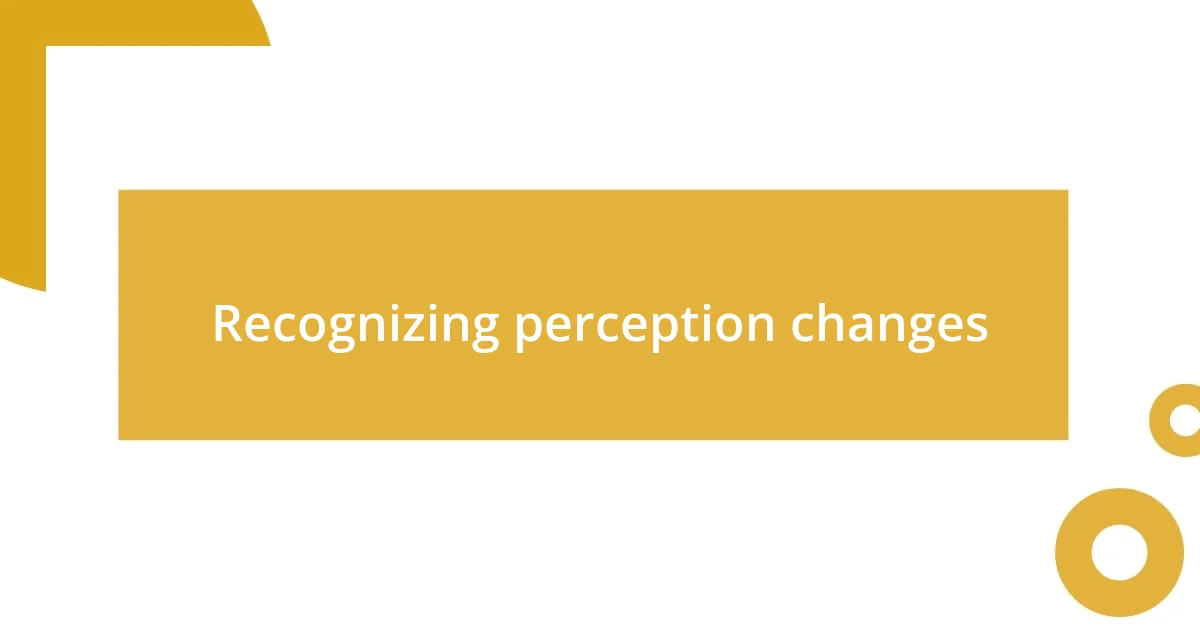
Recognizing perception changes
Recognizing shifts in our perception often starts with acknowledging the subtle changes in our emotions and thoughts. I remember moments when I’d see a friend’s message pop up, and instead of feeling excitement, I felt a sudden rush of anxiety. It was as if my mind, clouded by isolation, had rewritten the narrative. This new lens not only distorted how I viewed others but also influenced how I perceived my own self-worth.
- Increased sensitivity to social cues, leading to overthinking interactions.
- Heightened emotions like anxiety or sadness that feel disproportionate.
- A tendency to withdraw or feel disconnected even during social moments.
- Reinterpreting past experiences with a more negative or exaggerated spin.
- Questioning the authenticity of relationships or someone’s intentions.
Each of these indicators, familiar yet foreign, serves as a telling sign of how isolation can warp our perceptions.
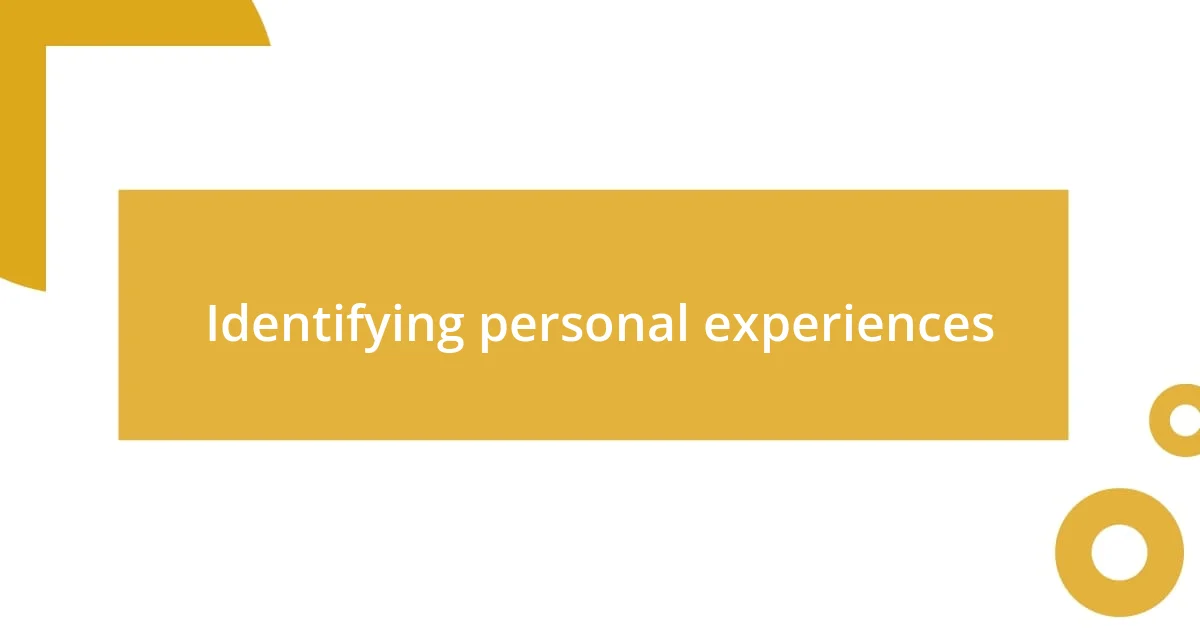
Identifying personal experiences
Identifying personal experiences can feel like chasing shadows in a dimly lit room. I vividly recall an evening when I decided to venture out for groceries after weeks of solitude. Instead of feeling liberated, I found myself scanning the faces of strangers, developing an irrational fear that they could see right into my thoughts. That experience taught me how isolation had tinted my view of reality, making every social interaction seem like a potential minefield.
As I reflected on that outing, I realized how much my former sense of security had eroded. There was a moment when a simple smile from a cashier sent a rush of warmth through me. Yet immediately after, I doubted whether it was genuine or just a polite societal reflex. I began to notice a pattern: each encounter, small or large, became riddled with second-guessing. Have you ever felt that your lens had become so skewed that an intended kindness suddenly felt like a façade?
This warping of perception was insidious; it transformed my understanding of connection altogether. I’ve found it helpful to jot down my feelings as they arise, almost like a journal of my fluctuating perceptions. This practice not only grounds me but also highlights the stark contrast between my feelings and reality. It’s like regaining a sense of control in a world that often feels overwhelming.
| Personal Experience | Perception Change |
|---|---|
| Grocery trip anxiety | Fear of social judgment |
| Warmth from a cashier’s smile | Doubting sincerity |
| Reflective journaling | Grounds fluctuating perceptions |
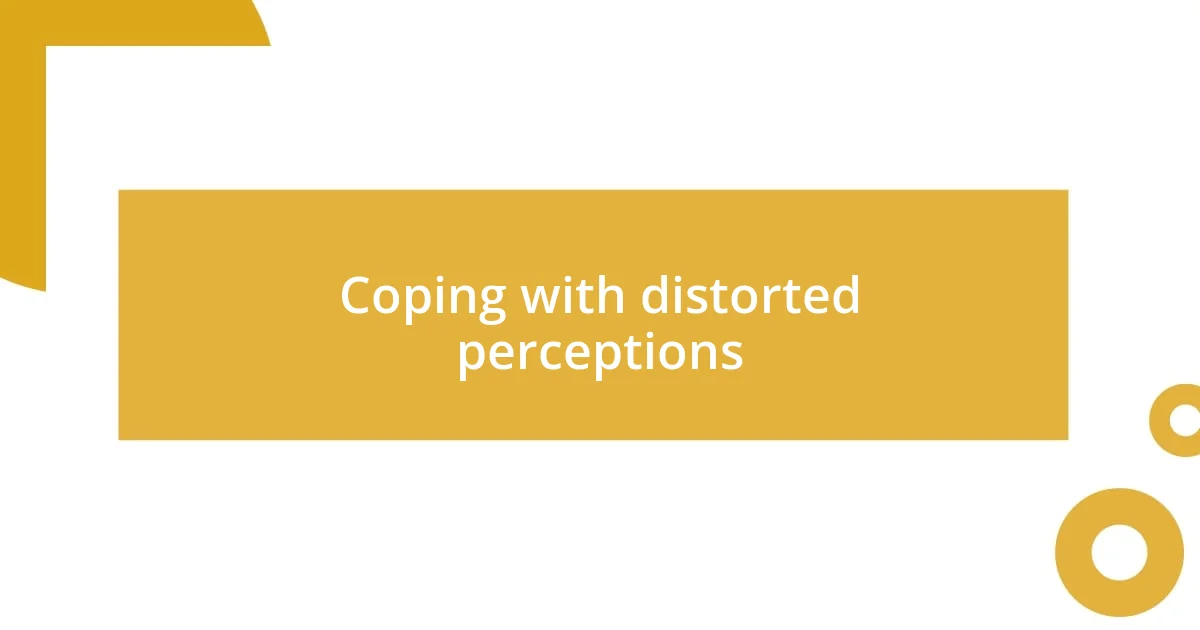
Coping with distorted perceptions
Coping with distorted perceptions often means confronting the nagging doubts that arise from isolation. I remember a time when I would replay conversations in my head, dissecting every word and wondering if I’d said the wrong thing. This habit was exhausting. Have you ever found yourself trapped in that cycle? It highlights how isolation can warp our self-perception and our view of others, making it vital to challenge these internal narratives before they spiral out of control.
I discovered that talking openly about my feelings, even if it felt uncomfortable, was a lifeline. During a video call with a close friend, I laid bare my struggles with anxiety and distorted thoughts. Their reassurance and understanding were refreshing. It reminded me that my perceptions were not always shared by others. This connection helped me realign my views and alleviated some of the emotional heaviness. Have you experienced the weight lifted when someone else simply ‘gets’ what you’re going through? It’s truly liberating.
Another effective strategy I found was practicing mindfulness. I would sit quietly, focus on my breathing, and acknowledge my thoughts without judgment. In those moments, I became aware of how my perception often skewed reality. For instance, I felt isolated even in a crowd, disconnected from the energy around me. But recognizing this made it easier to reframe these feelings. When did you last take a moment to simply breathe and observe your thoughts? This practice can provide clarity, serving as a necessary antidote to distorted perceptions and enabling a more balanced view of the world.
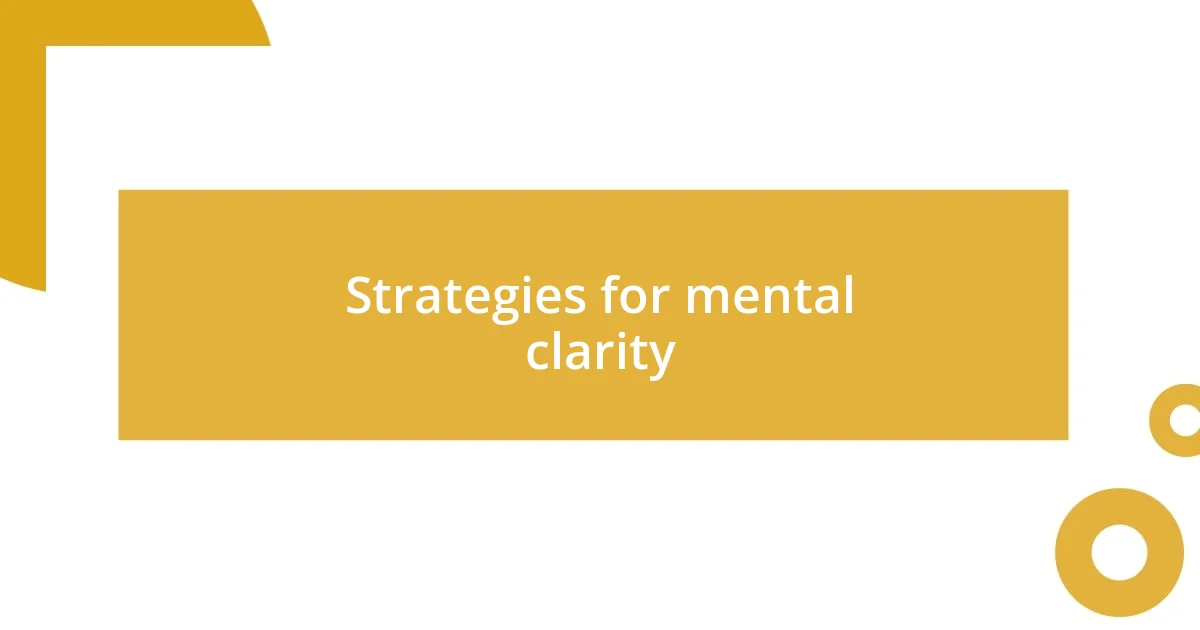
Strategies for mental clarity
Engaging in a simple practice of gratitude has truly transformed my mental clarity. There were days I felt enveloped by a fog of negativity, struggling to see any light at the end of the tunnel. I began to jot down three things I was grateful for every morning. It seemed trivial at first, but over time, it shifted my focus from what was wrong to what was positive. Have you ever tried this kind of intentional reflection? It’s remarkable how a few small shifts in perspective can brighten an entire day.
Another strategy that worked wonders for me was setting boundaries around my information intake. In an age of incessant news and social media, I found myself spiraling into confusion and anxiety. I made a conscious decision to limit my exposure to negative content, choosing instead to engage with uplifting stories or educational material that expanded my mind. The moment I did this, I felt a weight lift off my shoulders. Have you noticed how certain topics can linger in your mind long after you’ve disengaged? This practice can help clear that mental clutter.
Lastly, I realized the power of physical movement for clearing my mind. On days when isolation made me feel stagnant, a simple walk in nature worked like magic. The fresh air and changing scenery helped me shake off intrusive thoughts and regain mental clarity. Have you ever stepped outside and felt like a cloud was lifted? I often returned from those walks with newfound insight and a clearer sense of purpose. Integrating such movement breaks into my routine became a non-negotiable aspect of my day, offering a refreshing reset for my mind.
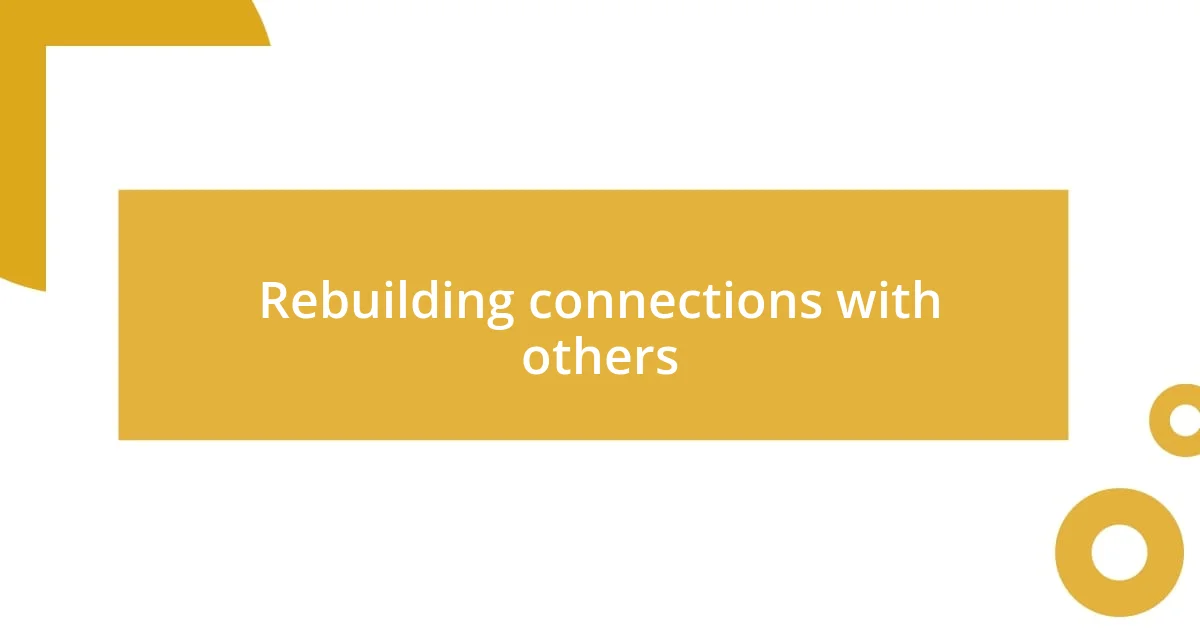
Rebuilding connections with others
Rebuilding connections has been a deeply personal journey for me. I remember feeling the sting of longing during those isolating months—my social circle had shrunk to a whisper. One day, I decided to reach out to an old friend I hadn’t spoken to in ages. I was nervous, thinking, “What if they’ve moved on?” But when we finally chatted, it felt like no time had passed. Have you ever rekindled a connection and realized just how much you’ve missed someone? It was a beautiful reminder of the importance of nurturing those ties.
Taking small steps can make a world of difference in reconnecting with others. I began attending community events, even if it felt daunting. I’d often find myself standing by the snacks, feeling like an outsider. But slowly, I struck up conversations that felt so rewarding. One evening, a simple chat about our favorite movies turned into a delightful exchange that kept me smiling for days. It’s amazing how shared interests can spark genuine connections—what are your passions that could bridge the gap with someone new?
Lastly, I found that vulnerability is a powerful tool in rebuilding connections. I began sharing my struggles more openly, whether in group chats or face-to-face encounters. Initially, it felt like a giant leap; who wants to show their flaws? Yet, each time I did, I noticed others reciprocating with their own stories. This mutual openness fostered deeper relationships. Have you considered how sharing your true self can create bonds that last? Every conversation turned into a foundation for trust, making my world a little bit brighter.
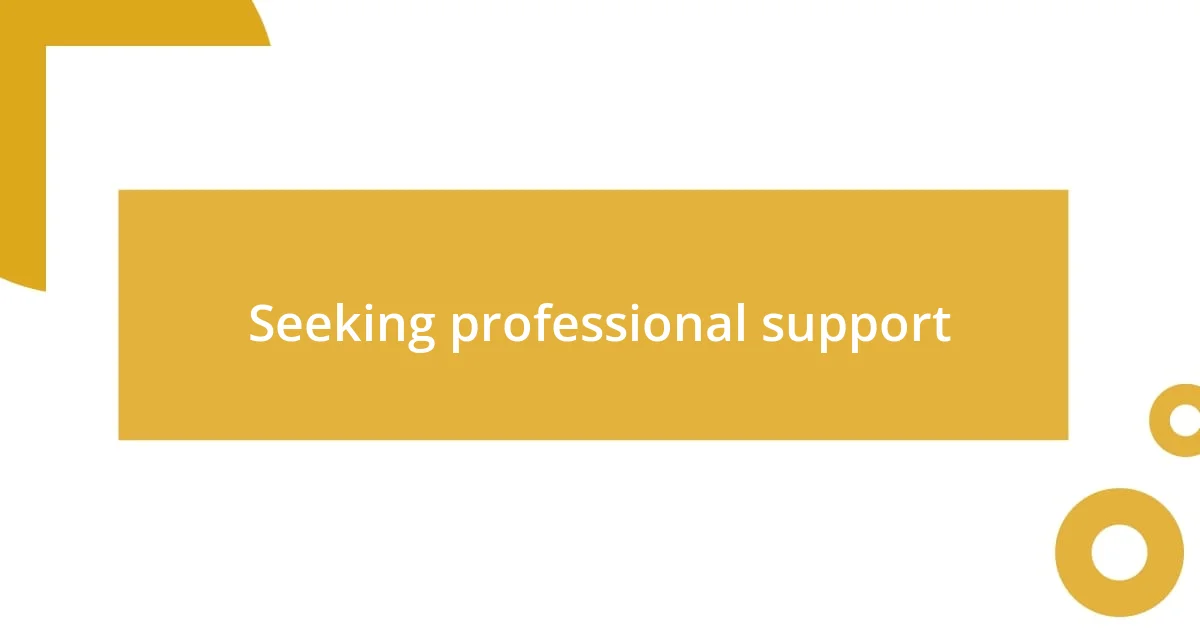
Seeking professional support
Seeking professional support can feel intimidating, yet it’s often a crucial step in untangling the threads of our experiences. I remember my first session vividly; I walked in, heart racing, thinking, “Will they even understand me?” But as my therapist patiently listened, I began to feel the weight of my isolation lift, inch by inch. Have you ever sat with someone who truly hears you? That connection is transformative.
Therapists offer insights that can unravel the complex emotions surrounding isolation. During one conversation, my therapist pointed out how my perception of solitude had shifted from a rare moment of peace to a heavy blanket smothering my joy. The realization struck me: I had the power to redefine that solitude. I began practicing self-compassion, treating myself with the same kindness I’d offer a friend. Isn’t it fascinating how changing our self-dialogue can illuminate such hidden truths?
It’s essential to find the right professional fit, though; not every therapist will resonate with you. I learned this the hard way, having sat through a few sessions that left me feeling more confused than before. It wasn’t until I found someone who understood my unique struggles and affirmed my feelings that I began to heal. Have you experienced that moment when the right person clicks into place? It can feel like finding a lighthouse in a foggy sea, guiding you home.
